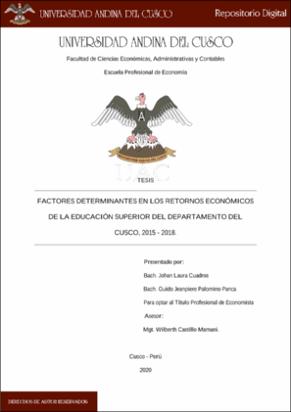| dc.contributor.advisor | Castillo Mamani, Wilberth | |
| dc.contributor.author | Laura Cuadros, Johan | |
| dc.contributor.author | Palomino Panca, Guido Jeanpiere | |
| dc.date.accessioned | 2021-02-09T23:55:09Z | |
| dc.date.available | 2021-02-09T23:55:09Z | |
| dc.date.issued | 2020-02-12 | |
| dc.identifier.uri | https://hdl.handle.net/20.500.12557/3659 | |
| dc.description.abstract | La presente investigación que lleva por título “Factores Determinantes en los Retornos
Económicos de la Educación Superior del Departamento del Cusco, 2015 – 2018” estudia
cuáles son los factores determinantes en los retornos económicos de la educación superior, los
cuáles son el nivel educativo, el empleo y la edad. El objetivo general de la investigación es
determinar los factores determinantes en los retornos económicos de la educación superior en
el departamento del Cusco, 2015 – 2018, para esto se analizará cada variable de estudio de
manera específica y cuantificable para así precisar en qué medida influyen estas variables
independientes a la variable dependiente.
La investigación es de tipo aplicada, con un enfoque cuantitativo ya que se analizan las
mediciones obtenidas utilizando métodos estadísticos, esta investigación es longitudinal con
un análisis de datos transversal porque se mide en un periodo de tiempo y se analiza año por
año. Para lo cual se utiliza los datos obtenidos de la Encuesta Nacional de Hogares (ENAHO)
para los distintos años de estudio, utilizando el programa estadístico STATA para el
procesamiento y análisis de los datos.
Partiendo de la teoría de Mincer se ha elaborado el modelo econométrico teniendo como
hallazgos más relevantes que las variables (nivel educativo, empleo y edad) si son factores
determinantes en los retornos económicos de la educación superior, ya que, según los
resultados obtenidos, las variables independientes explican en un 40% en promedio a la
variable dependiente, se halló un P-valor menor a 0.005 por lo cual se rechazaron todas las
hipótesis nulas. También se mostró que a mayor nivel educativo mayores son los ingresos, así
mismo se observó que el nivel educativo superior Universitaria posee mayores retornos
económicos a comparación del No Universitaria, a su vez el sector de empleo influye en los
salarios, siendo más favorable laborar en el sector público, ya que este genera mayores ingresos. Si es verdad que la edad también influye de manera no tan significativa pero solo hasta cierto
punto, ya que después de cierta edad los ingresos comienzan a decrecer. | es_PE |
| dc.description.abstract | This research, entitled “Determinant Factors in the Economic Returns of Higher Education of
the Department of Cusco, 2015 - 2018“ studies what are the determining factors in the
economic returns of higher education, which are the educational level, the Employment and
age. The general objective of the research is to determine the determining factors in the
economic returns of higher education in the department of Cusco, 2015 - 2018, for this, each
study variable will be analyzed in a specific and quantifiable way in order to specify the extent
to which these independent variables to the dependent variable.
The research is applied, with a quantitative approach since the measurements obtained using
statistical methods are analyzed, this research is longitudinal with a cross-sectional data
analysis because it is measured over a period of time and analyzed year by year. For which the
data obtained from the National Household Survey (ENAHO) is used for the different years of
study, using the STATA statistical program for data processing and analysis.
On the basis of the Mincer theory, the econometric model has been elaborated, having as more
relevant findings than the variables (educational level, employment and age) if they are
determining factors in the economic returns of higher education, since, according to the results
obtained, the Independent variables explain 40% on average to the dependent variable, a P-
value less than 0.005 was found, so all null hypotheses were rejected. It was also shown that
the higher the level of education, the higher the income, it was also observed that the higher
level of university education has higher economic returns compared to the Non-University, in
turn the employment sector influences wages, being more favorable to work in the public sector
since this generates greater income. If it is true that age also influences not so significantly but
only to a certain extent, since after a certain age income begins to decrease. | en_US |
| dc.description.uri | Tesis | es_PE |
| dc.format | application/pdf | es_PE |
| dc.language.iso | spa | es_PE |
| dc.publisher | Universidad Andina del Cusco | es_PE |
| dc.rights | info:eu-repo/semantics/restrictedAccess | es_PE |
| dc.source | Universidad Andina del Cusco | es_PE |
| dc.source | Repositorio Institucional UAC | es_PE |
| dc.subject | Educación superior | es_PE |
| dc.subject | Modelo econométrico | es_PE |
| dc.subject | Nivel educativo | es_PE |
| dc.title | Factores determinantes en los retornos económicos de la educación superior del departamento del Cusco, 2015 - 2018 | es_PE |
| dc.type | info:eu-repo/semantics/bachelorThesis | es_PE |
| thesis.degree.name | Economista | es_PE |
| thesis.degree.grantor | Universidad Andina del Cusco. Facultad de Ciencias Económicas, Administrativas y Contables | es_PE |
| thesis.degree.level | Titulo Profesional | es_PE |
| thesis.degree.discipline | Economía | es_PE |
| dc.publisher.country | PE | es_PE |
| dc.subject.ocde | https://purl.org/pe-repo/ocde/ford#5.02.00 | en_US |
| renati.advisor.dni | 40650638 | |
| renati.advisor.orcid | https://orcid.org/0000-0002-4985-4870 | |
| renati.author.dni | 73985382 | |
| renati.author.dni | 73422805 | |
| renati.discipline | 311016 | |
| renati.juror | Vargas Jibaja, Aurelio | |
| renati.juror | Vasquez Tevez, Manuel | |
| renati.juror | Urrutia Mellado, Benedicta Soledad | |
| renati.juror | Bellota Cavanaconza, Vianey | |
| renati.level | https://purl.org/pe-repo/renati/level#tituloProfesional | es_PE |
| renati.type | https://purl.org/pe-repo/renati/type#tesis | es_PE |

